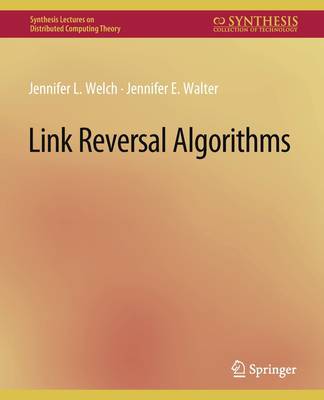
- Afhalen na 1 uur in een winkel met voorraad
- Gratis thuislevering in België vanaf € 30
- Ruim aanbod met 7 miljoen producten
- Afhalen na 1 uur in een winkel met voorraad
- Gratis thuislevering in België vanaf € 30
- Ruim aanbod met 7 miljoen producten
Zoeken
Omschrijving
Link reversal is a versatile algorithm design technique that has been used in numerous distributed algorithms for a variety of problems. The common thread in these algorithms is that the distributed system is viewed as a graph, with vertices representing the computing nodes and edges representing some other feature of the system (for instance, point-to-point communication channels or a conflict relationship). Each algorithm assigns a virtual direction to the edges of the graph, producing a directed version of the original graph. As the algorithm proceeds, the virtual directions of some of the links in the graph change in order to accomplish some algorithm-specific goal. The criterion for changing link directions is based on information that is local to a node (such as the node having no outgoing links) and thus this approach scales well, a feature that is desirable for distributed algorithms. This monograph presents, in a tutorial way, a representative sampling of the work on link-reversal-based distributed algorithms. The algorithms considered solve routing, leader election, mutual exclusion, distributed queueing, scheduling, and resource allocation. The algorithms can be roughly divided into two types, those that assume a more abstract graph model of the networks, and those that take into account more realistic details of the system. In particular, these more realistic details include the communication between nodes, which may be through asynchronous message passing, and possible changes in the graph, for instance, due to movement of the nodes. We have not attempted to provide a comprehensive survey of all the literature on these topics. Instead, we have focused in depth on a smaller number of fundamental papers, whose common thread is that link reversal provides a way for nodes in the system to observe their local neighborhoods, take only local actions, and yet cause global problems to be solved. We conjecture that future interesting uses of link reversal are yetto be discovered. Table of Contents: Introduction / Routing in a Graph: Correctness / Routing in a Graph: Complexity / Routing and Leader Election in a Distributed System / Mutual Exclusion in a Distributed System / Distributed Queueing / Scheduling in a Graph / Resource Allocation in a Distributed System / Conclusion
Specificaties
Betrokkenen
- Auteur(s):
- Uitgeverij:
Inhoud
- Aantal bladzijden:
- 93
- Taal:
- Engels
- Reeks:
Eigenschappen
- Productcode (EAN):
- 9783031008788
- Verschijningsdatum:
- 20/11/2011
- Uitvoering:
- Paperback
- Formaat:
- Trade paperback (VS)
- Afmetingen:
- 190 mm x 235 mm
- Gewicht:
- 195 g

Alleen bij Standaard Boekhandel
+ 69 punten op je klantenkaart van Standaard Boekhandel
Beoordelingen
We publiceren alleen reviews die voldoen aan de voorwaarden voor reviews. Bekijk onze voorwaarden voor reviews.











